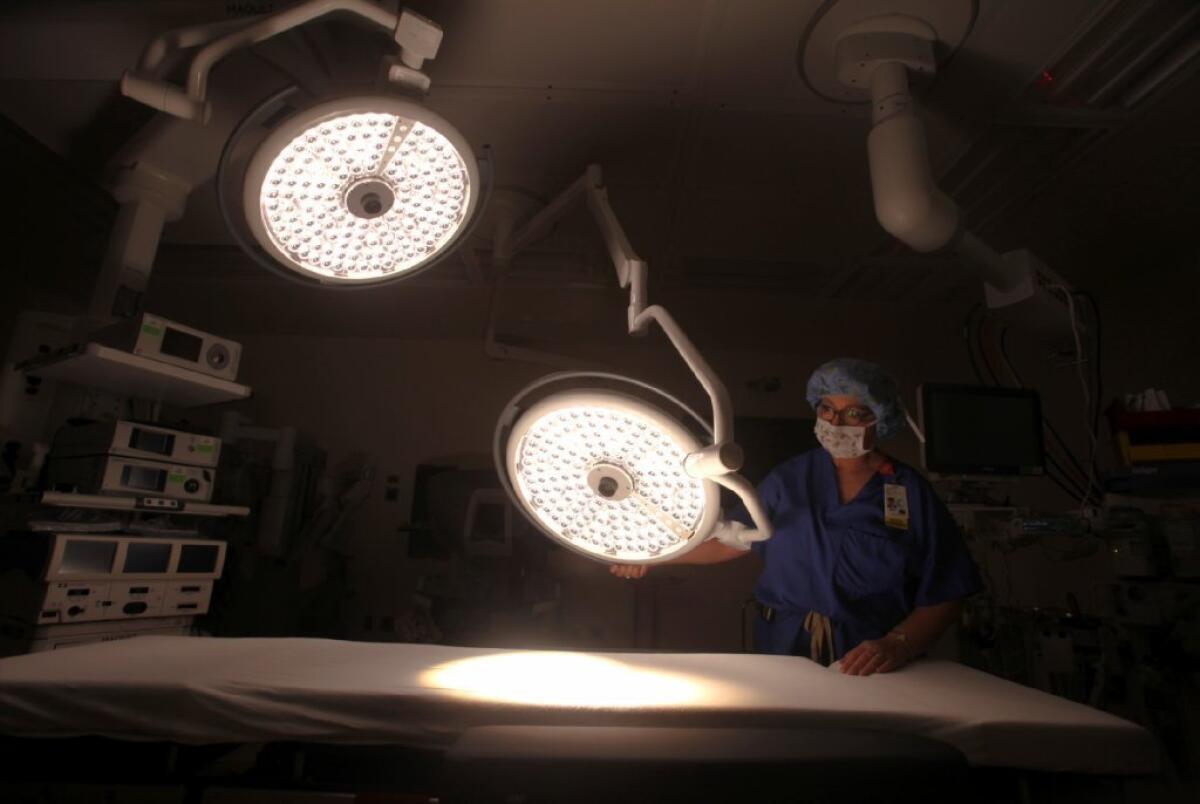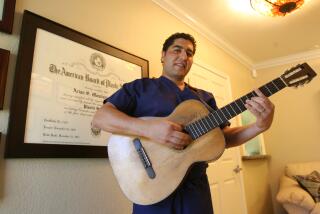Medical community reflects on ‘disgusting and scandalous’ episodes in the operating room

A provocative essay in Annals of Internal Medicine shines a light on unsavory behavior in the operating room.
A man stroked the inner thighs and genitals of a woman who lay unconscious on a table. “I bet she’s enjoying this,” he said with a wink and a laugh.
The scenario would be disturbing under any circumstances, but even more so when you know this: The man was a surgeon, and the woman was the patient he was prepping for a vaginal hysterectomy.
Though the doctor’s actions were a necessary part of prepping for the procedure — cleansing and scrubbing with cotton balls — his astonishing comment while doing so was seared into the brain of a medical student who was in the operating room.
The student’s recounting of the event appeared this week in the pages of the prestigious Annals of Internal Medicine, in an article written by his medical school instructor.
Why would the journal’s editors choose to publicize this unsavory view into the secret lives of doctors?
At first, they weren’t sure they should. When the essay describing the incident came before them, the debate about whether to publish it became so heated that they had to table their decision for a week until emotions had cooled.
“We all agreed that the piece was disgusting and scandalous and could damage the profession’s reputation,” they explained in an editorial that accompanied the provocative essay. “Some believed that this was reason not to publish the story. Others believed that it was precisely why we should publish it.”
The tale of the woman who came in for a hysterectomy and wound up being victimized by her surgeon is only the start of the essay, titled “Our Family Secrets.”
The anonymous author — who changed the names of everyone he described — said the issue came up while he was leading a medical humanities class. The topic had been the “virtue of forgiveness,” he explained, and he had asked his fourth-year medical students whether their training had exposed them to anything unforgivable.
After the student’s painful admission that he felt pressured to laugh at the surgeon’s crude behavior — “What was I supposed to do?” he asked — the author decided to come clean about an event from his own med school days.
The author was on an OB-GYN rotation and had just delivered a baby girl. Then the mother, a Latina, began bleeding uncontrollably.
A resident dubbed “Dr. Canby” took charge and diagnosed the condition as uterine atony, a complication in which the muscles of the uterus fail to contract after delivery.
After an anesthesiologist arrived and administered ketamine, the resident massaged the patient’s uterus with his right hand on her abdomen and his left hand inside her body. A few minutes later, the bleeding stopped.
“The guy saved her life,” the essay author told his students. “I was blown away.”
Here’s what happened next, as he recounted in his essay:
“Dr. Canby raises his right hand into the air. He starts to sing ‘La Cucaracha.’ He sings, ‘La cucaracha, la cucaracha, dada, dada, dada-daaa.’ It looks like he is dancing with her. He stomps his feet, twists his body, and waves his right arm above his head.
“All the while, he holds her, his whole hand still inside her vagina. He starts laughing. He keeps dancing. And then he looks at me. I begin to sway to his beat. My feet shuffle. I hum and laugh along with him. Moments later, the anesthesiologist yells, ‘Knock it off, assholes!’ And we stop.”
The journal editors said they had no idea how frequently physicians treat their patients this way, or how often young doctors or medical students feel compelled to go along with the boorish behavior of their superiors. But they said most doctors catch a colleague behaving disrespectfully toward a patient at least once in their career.
Their hope is that after reading the essay, more doctors will find the strength to do the right thing — for themselves and their patients.
“We all need the strength to act like the anesthesiologist in this story and call our colleagues ‘assholes’ when that label is appropriate,” the editors wrote.
Doctors and patients have responded with a range of emotions.
Some have praised the journal for bringing an uncomfortable issue out of the shadows and into the light. They said the anecdotes — while extreme — fit a troubling pattern of doctors failing to take their female patients seriously.
“As a family physician, I hear stories weekly of physicians who discount the lived experiences of women,” Dr. Elizabeth Allemann, who has a practice in Columbia, Mo., wrote on the Annals website. “We can do better. This will help. Thank you.”
Another commenter, who said she was a retired primary care physician, said she was surprised that people still buy into the “myth” that doctors are tantamount to saints.
“Why is it so shocking that doctors are just as prone to sociopathy and criminality as any other group in which vulnerable people are forced to place their trust?” wrote Dr. Munita Singh. “Perhaps the era of protecting the ‘profession’s reputation’ is over. After all, doctors are now being rated alongside restaurant food on marketing apps.”
One person defended the doctors described in the essay who, in his view, were merely trying to defuse high-pressure situations by injecting some levity into the operating room.
“The stress on these professionals is SO great that once in awhile, a little steam MUST be released in order to bring themselves and their teams back into some logical perspective,” wrote Robert J. Pegritz, who described himself as a medical/legal consultant. “The lay observer or medical student has no idea of the cumulative stress that can be present inside someone who daily cuts open living, breathing people.”
Pegritz continued:
“Respect and integrity are not lost when a surgeon or P.A. [physician assistant] does the surgical equivalent of a victory dance. They’ve just saved a life or spared someone months or even years of suffering. And I’m certain that if the patient were awake during a surgery to bypass an expanding aneurysm or control hemorrhage in a patient with postpartum uterine atony, he or she would be singing the third-part harmony of La Cucaracha right along with the surgeon and the P.A.”
Twitter: @LATkarenkaplan







